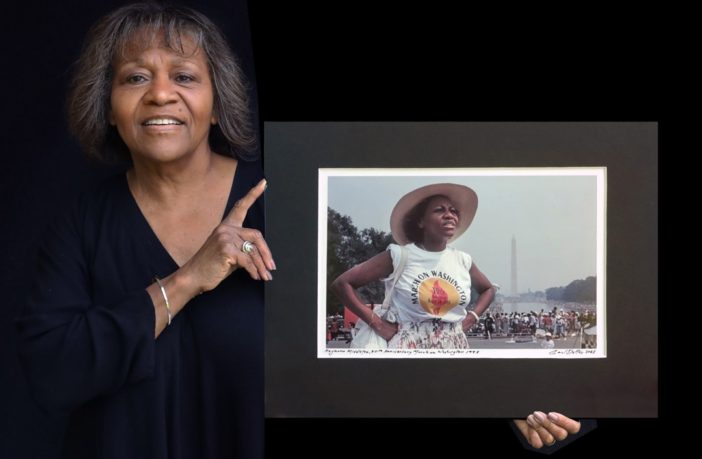By Earl Dotter,
Special to the AFRO,
All photos by Earl Dotter
On the afternoon of Aug. 28 1993, the humidity and heat were overwhelming. I had spent the morning photographing an assignment for the United Autoworkers (UAW) for its magazine, called Solidarity. From around the country, autoworkers were attending the 30th anniversary of the “I Have Dream” speech that Martin Luther King gave on Aug. 23, 1963, from the steps of the Lincoln Memorial.
The speech galvanized the Civil Rights Movement.
Among the photos that I took that day at the 1993 commemoration of the speech was one of a quite striking woman, Raymona Middleton, a third-generation Washingtonian who in 1963, at the tender age of 13, had begged her mother to let her attend the march to hear King speak.
Recently, when going through an early correspondence file, I came across the letter Ms. Middleton wrote to me in December of 1993 after I sent her pictures I had taken of her at the 30th anniversary. Her letter described that day in 1963 to me.
“My mother, expecting trouble, forbade me to attend. No amount of pouting or tears changed my mother’s mind. I had to stay home watching it all on television,” she said. “I, like millions of Americans, even as a young teenager, had seen on TV the horrific violence throughout Alabama, Mississippi, and other parts of the Deep South towards African Americans. Some of these TV broadcasts showed police attack dogs and local firefighters using water hoses on the marchers, and people being dragged through the streets like trash.”
“By age 14, I had an awareness of severe racism towards people who looked like me. I remember what happened when police and state troopers killed and severely injured not just Black folks, but many White students who had emerged from the North to travel south to encourage Voting Rights,” continued Middleton. “In 1965, two years after the original MLK March on Washington, the violence continued towards Lutheran Clergy, Jewish Rabbis and Catholic Priests during the march from Selma to Montgomery, better known to me as “Bloody Sunday.”
Finding Raymona Middleton’s letter written in December 1993 inspired me to try to locate her this past spring. After three decades, I was able to locate her current phone number and gave her a call. She quickly recalled that day in 1993 at the Lincoln Memorial and the photos that I had taken of her. She told me that she had saved the page in UAW Solidarity Magazine that featured her photo, and had framed and hung it in her home, where it still hangs. I learned that the original photos I had sent her long ago had been lost during a move, so I arranged to make a home visit to give her replacements.
Raymona Middleton, a March on Washington participant who stood out at the Lincoln Memorial in 1993, still stands out today. (Photo by Earl Dotter)
I also asked Raymona if I could update her portrait while she held some of the photographs, I had taken of her during the August 28th, 1993, 30th Anniversary March. I wanted to show in photographs of her now, that her life still stands out today. Raymona Middleton is a woman of faith who has imbued her life with social purpose – often she has been inspired by the pastors at her church, Rev. Dr. Grainger Browning and Rev. Dr. JoAnn Browning. It took two weeks before we could arrange a convenient time for me to stop by her home in Charles County, Md. During that time, I began to get a clearer idea of all the socially useful work that continues to occupy her time these days.
That conversation led Raymona to convey some of her own family genealogical history. That research on Ancestry and Family Search revealed her maternal great, great, great grandparents, Jacob Richardson, born enslaved in 1795 with his wife, Mariah born in 1837, were both emancipated in Queen Anne County, Md., according to the 1860 Census. Her paternal great-great grandfather John Alexander, was born in 1801 with his wife Hannah Alexander, born in 1805, in the 54th District, Russell County, Va., in the 1850 Census – they were listed as free inhabitants – mulatto farmers.
“I believe that Dr. King, like most of us, would be discouraged by the current political status of our country. Back in January 2014, I decided to have DNA testing. To my surprise, the outcome was that I’m a total mix of everybody:
90 percent -African,
1 percent -Native American
1 percent -Asian
7 percent European [Irish/Finish/Iberian]
1 percent -Caucasian
Most importantly, I am a true American, and I’ll tell you why…. from both my maternal and paternal grandfathers to my own father- as well as my son, Robert- have all fought in the military to protect and defend these United States of America. I am still searching, but yet to find supporting documents of a Civil War Patriot in my lineage. I am a descendant of former slaves who helped build this great country of ours, and feel that their blood, sweat, and tears are still crying out from the ground we walk on for “equality and justice for all!”



